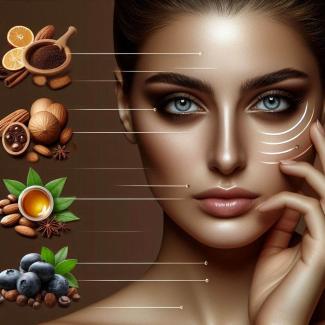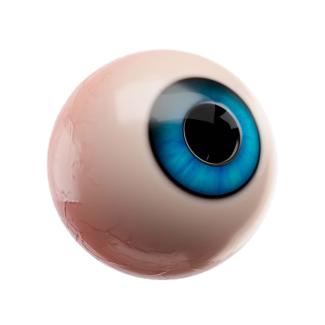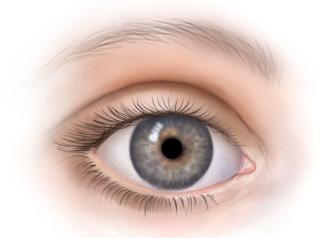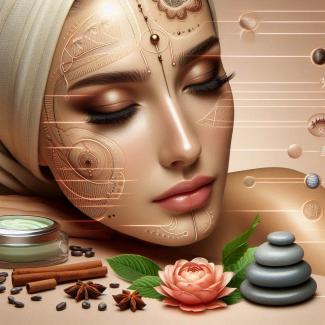
Dark circles under the eyes are a common cosmetic concern for many people, affecting individuals across various ages, genders, and ethnicities. Often associated with tiredness and lack of sleep, these discolorations can persist even in well-rested individuals. They result from a variety of causes, ranging from lifestyle factors to genetics, health conditions, and the natural aging process. For many, dark circles may be more than just a cosmetic issue, sometimes indicating an underlying medical condition. This comprehensive overview will explore the causes of dark circles, potential remedies, and preventive strategies.
1. What Are Dark Circles?
Dark circles, medically termed "periorbital hyperpigmentation" or "periorbital darkening," refer to the discoloration or darkening of the skin under the eyes. The periorbital area is particularly delicate, with thinner skin compared to other parts of the face, making it more susceptible to changes in pigmentation, blood vessel visibility, and fluid retention. Dark circles are not usually painful or harmful but can contribute to a tired, aged, or unhealthy appearance.
2. What Causes Dark Circles?
There are numerous causes of dark circles, and they are typically multifactorial. Understanding these can provide insight into effective treatments and preventative measures.
2.1 Genetics
Genetics play a significant role in the development of dark circles. Some individuals inherit thinner skin around the eyes or a predisposition to hyperpigmentation in this area. The thin skin can make underlying blood vessels more visible, creating a bluish or purplish hue. Similarly, some people have a genetic tendency toward increased melanin production, resulting in darker skin in the under-eye region, especially in individuals with darker skin tones.
2.2 Aging Process
As we age, several physiological changes occur that can contribute to dark circles:
- Loss of collagen and fat: The skin naturally loses collagen and fat over time, particularly in the face, leading to hollowing and increased visibility of underlying structures, such as blood vessels. The thinning skin can make the area under the eyes appear darker.
- Decreased skin elasticity: Over time, skin loses its ability to bounce back, contributing to sagging or puffiness around the eyes, which can cast shadows that create the appearance of dark circles.
- Slower circulation: Blood circulation tends to slow down with age, leading to pooling of blood in delicate areas like under the eyes. This stagnant blood can appear dark, contributing to a more pronounced discoloration.
2.3 Lack of Sleep
One of the most commonly cited causes of dark circles is lack of sleep. Insufficient sleep can cause the skin to appear pale, which allows blood vessels and darker tissues to become more visible. Additionally, tiredness can lead to fluid retention, causing puffiness under the eyes. The swollen areas cast shadows, which can exacerbate the appearance of dark circles.
2.4 Dehydration
When the body is dehydrated, the skin tends to appear dull and less plump, highlighting the eyes’ underlying structure, including veins and bones. Dehydration can also lead to the loss of elasticity and the formation of fine lines, which further accentuate dark circles. Consistent hydration is crucial for maintaining healthy, vibrant skin, and dark circles are often a signal of underlying fluid imbalance.
2.5 Allergies
Allergic reactions can cause dark circles due to an inflammatory response and histamine release, which dilates blood vessels and can cause the skin to appear red or darker. The condition known as "allergic shiners" refers to the darkened skin under the eyes, which often results from allergies. Rubbing or scratching the eyes in response to allergic itching can further exacerbate this darkening by damaging blood vessels and skin integrity.
2.6 Hyperpigmentation
Hyperpigmentation refers to the overproduction of melanin, which can result in dark spots or areas of the skin. In the case of dark circles, hyperpigmentation often appears due to:
- Sun exposure: UV radiation can stimulate melanin production, especially in individuals prone to pigmentation, causing dark circles to worsen over time.
- Post-inflammatory hyperpigmentation (PIH): Inflammation or damage to the skin can lead to an overproduction of melanin as the skin attempts to heal itself. This is common in individuals with darker skin tones who experience trauma or irritation around the eyes, such as from rubbing, allergies, or previous conditions like eczema.
2.7 Lifestyle Factors
Several lifestyle choices can contribute to the formation or exacerbation of dark circles:
- Smoking: Smoking leads to the constriction of blood vessels, impairing circulation and depriving the skin of oxygen and nutrients. The thin skin around the eyes can become dull and discolored as a result.
- Excessive alcohol consumption: Alcohol causes dehydration, which can lead to puffiness and the appearance of dark circles. It also affects the liver, and poor liver function can lead to fluid retention and toxin buildup, which may manifest as dark circles.
- Dietary deficiencies: Lack of certain vitamins and minerals, particularly iron, can lead to anemia. Anemia is linked to poor oxygenation of tissues, which may make the skin under the eyes appear dark and dull. Other deficiencies, such as low levels of vitamins C, E, and K, can also affect the appearance of the skin and exacerbate the problem.
2.8 Medical Conditions
Some medical conditions are associated with dark circles:
- Anemia: As mentioned, low levels of iron reduce the blood’s capacity to carry oxygen, leading to dull and pale skin, especially around the eyes.
- Thyroid conditions: Hypothyroidism and hyperthyroidism can affect skin texture and tone. These conditions may contribute to puffiness and discoloration around the eyes.
- Periorbital edema: This is the swelling around the eyes due to fluid retention, which can cause shadows and dark circles.
- Atopic dermatitis (eczema): Chronic inflammation of the skin, particularly when it involves the face, can lead to darkening of the under-eye area.
3. How to Eliminate Dark Circles Under the Eyes?
There are numerous ways to reduce or eliminate dark circles under the eyes, depending on the underlying cause. Solutions range from home remedies and lifestyle changes to medical treatments and cosmetic procedures.
3.1 Topical Treatments
Topical treatments aim to lighten hyperpigmentation, improve skin elasticity, and promote blood circulation. Common ingredients in creams and serums for dark circles include:
- Vitamin C: Known for its brightening and antioxidant properties, vitamin C helps reduce melanin production, lightening hyperpigmentation and improving skin tone.
- Retinoids: Retinoids promote collagen production and skin cell turnover, which can help thicken the skin and reduce the visibility of blood vessels. However, retinoids can cause irritation, especially around the sensitive eye area, so it is essential to use these products cautiously.
- Hyaluronic acid: This hydrating ingredient helps plump the skin, reducing the hollow appearance that can contribute to dark circles.
- Caffeine: Caffeine is often included in eye creams because it constricts blood vessels, reducing puffiness and improving the appearance of dark circles.
- Niacinamide: This form of vitamin B3 has anti-inflammatory and brightening effects, helping to reduce hyperpigmentation and support the skin’s barrier function.
- Vitamin K: Known for its role in blood clotting, vitamin K is sometimes used in creams to strengthen capillaries and reduce the pooling of blood in the periorbital area.
3.2 Lifestyle Adjustments
Certain lifestyle changes can significantly improve the appearance of dark circles:
- Improved sleep habits: Ensuring 7-9 hours of quality sleep per night can help prevent dark circles caused by tiredness. Elevating the head with an extra pillow may also prevent fluid buildup under the eyes.
- Hydration: Drinking adequate water helps keep the skin hydrated, reducing the prominence of blood vessels and preventing dehydration-related dullness.
- Balanced diet: Consuming a diet rich in antioxidants, iron, and vitamins can improve the skin’s appearance. Leafy greens, fruits, nuts, and seeds are excellent choices for maintaining healthy skin.
- Reducing alcohol and tobacco use: Limiting alcohol intake and quitting smoking can improve blood circulation and skin quality, helping to reduce dark circles over time.
3.3 Home Remedies
Several home remedies have been used to alleviate dark circles, though their efficacy can vary:
- Cold compress: Applying a cold compress or chilled tea bags (especially green or chamomile) to the eyes can constrict blood vessels, reducing puffiness and the visibility of dark circles.
- Cucumber slices: Cucumber slices are often applied to the eyes for their cooling and hydrating effects, helping to reduce swelling and lighten dark circles temporarily.
- Aloe vera: Aloe vera’s anti-inflammatory and moisturizing properties can help soothe and hydrate the skin, potentially reducing the appearance of dark circles.
3.4 Medical Treatments
For persistent or severe dark circles, medical interventions may be necessary. Some options include:
- Chemical Peels: Chemical peels containing ingredients like glycolic acid or lactic acid can help lighten hyperpigmentation by exfoliating the top layer of skin and encouraging the growth of new, healthy skin cells.
- Laser Therapy: Laser treatments target pigment in the skin and encourage collagen production, improving skin texture and tone. Lasers like Q-switched lasers or fractional lasers can reduce hyperpigmentation and stimulate collagen to reduce hollowness.
- Dermal Fillers: In cases where dark circles result from hollowness under the eyes, dermal fillers like hyaluronic acid can restore volume, reducing the shadow






